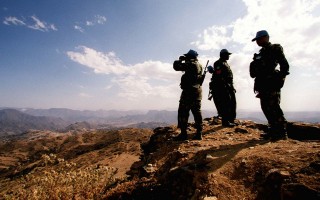Over the years, relations between Eritrea and Ethiopia have become very akin to a ticking time bomb, always ready to explode. On the 12th of June 2016, another timer went off as soldiers of both countries clashed at Tserona central front, an area located 75 kilometres south of the Eritrea’s capital, Asmara.
Tensions between both parties have been on the rise due to Ethiopia’s refusal to vacate Badme, a disputed territory between both countries, despite an international court ruling, in 2002, declaring that the area is Eritrean territory. This ruling came at the end of a two-year fight which concluded in June, 2000.
Just like in 2008 when Eritrea, in a letter to the UN security council, accused the US of orchestrating the Djibouti/Eritrea conflict as a “diversionary scheme,” Eritrea is once again pointing fingers at the US for the current violence along its borders, calling it an attack against Eritrean territory.
Girma Asmerom, Eritrean Ambassador to the United Nations, claims that Ethiopia’s relationship with the US denotes the latter’s complicity in the attacks on his country. “They have been supplying them with different equipment and ammunition in the name of fighting terrorism and they have been deploying [weapons] around the border area, so that is a direct or indirect participation in the aggression against Eritrea,” he said.
US responds to this allegation
Following the clashes, the United States voiced “grave concern” and called on both sides to exercise restraint and engage in political dialogue instead.
US State Department spokesman, James Kirby, dismissed the accusations and urged the arch-rivals to cooperate in promoting stability and sustainable peace in the region.
“As both Ethiopia and Eritrea are party to the 2000 Cessation of Hostilities Agreement and there cannot be a military solution, we call for both sides to exercise restraint and engage in political dialogue,” he said in a statement.
However, Eritrea has downplayed the statement from the US, remarking that it is nothing but ‘crocodile tears.’ “In the event, shedding crocodile tears and issuing a bland statement by the spokesperson of the US State Department calling on ‘both sides to show restraint’ cannot impress anyone,” the aggrieved country’s statement added.
On Tuesday, Eritrean Presidential Advisor, Yemane Ghebreab, told the UN Human Rights Council that Ethiopia is contemplating full-scale war against Eritrea. Yemane made the remarks, while defending his country against allegations of crimes against humanity.
“As we speak Ethiopia is making preparations for a bigger military offensive and contemplating a full-scale war,” he said.
Girma Asmerom Tesfay, Eritrea’s UN Permanent Representative, said that there is clear evidence that Ethiopia has adopted a hostile policy towards his country, citing the June 12th confrontation between the two countries as evidence of Ethiopia’s intention to cause a regime change and occupy Eritrea.
“The evidence is their own statement that they have made in their parliament, and a lot of [Ethiopian] officials have been saying… that they will attack Eritrea, they will take military action, they have changed their policy towards Eritrea, they will go for a regime change…support opposition armed groups to attack,” Ambassador Asmerom told Voice of America (VOA).
Ethiopia denies Eritrean accusations
Ethiopia has responded to these accusations through its Ambassador to the UN, Tekeda Alemu, who dismissed the allegations as ‘preposterous and without merit.’ He told VOA that the accusations against his country did not warrant a response, adding that perhaps, the government of Eritrea should worry more about addressing the concerns of the UN human rights court.
Eritrea’s Ambassador Asmerom denies that his country is trying to deflect attention from human rights reports that accuse his country of “systematic, widespread” human rights abuses by UN human rights investigators who have accused Eritrea’s leaders of crimes against humanity, including torture, rape and murder, over the past 25 years.
Eritrea also faces accusations of enslaving at least 300,000 of its own people and operating a shoot-to-kill policy on its borders to stop people from fleeing abroad. Yesterday, about 4000 Eritreans from across Europe staged a protest in Geneva against a recommendation by the United Nations’ Commission of Inquiry (COI), that Eritrea be referred to the International Criminal Court (ICC) for crimes against humanity.
Regarding the recent violence with Ethiopia, Eritrea has ruled out the possibility of any talks between the two countries.








